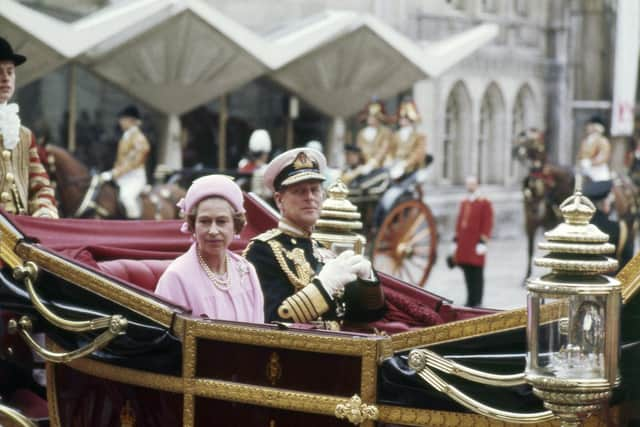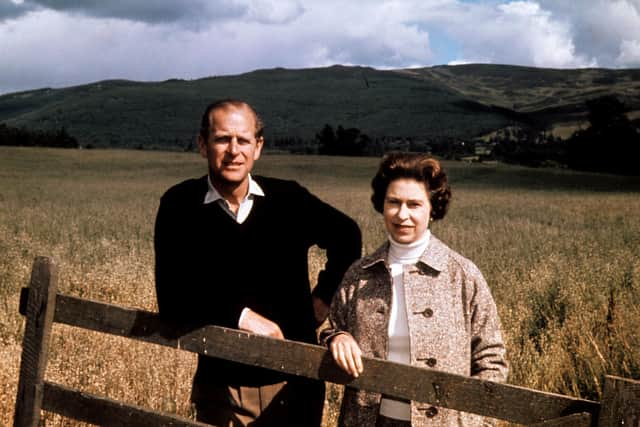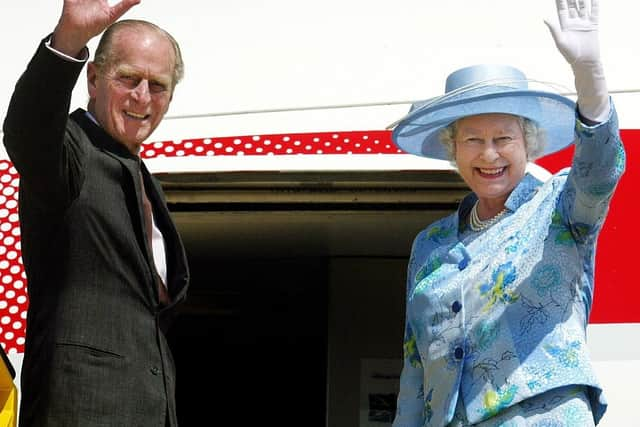Queen Elizabeth II: Obituary
The longest-reigning monarch in British history became so constant a part of the nation’s fabric that the vast majority of her subjects could not remember a time when she was not there.
Benevolent and comforting through national tragedy and turmoil, her presence was a reassuring reminder that stability and good sense would always prevail, because she symbolised her people’s core values of decency, tolerance and fairness.
Advertisement
Hide AdAdvertisement
Hide AdBut she was tough and pragmatic too, doing whatever was necessary to preserve the monarchy, even at the great personal cost of hurting her own family.


The Queen was ruthless in effectively sacking Prince Andrew, her favourite son, from royal duties in 2019 after he became drawn into the scandal surrounding a billionaire convicted paedophile. And the following year, she took a hard line with the Duke and Duchess of Sussex when they announced they wanted to step back from royal duties, live abroad, and earn money.
They were barred from using their HRH titles and receiving taxpayers’ funding. Royal status was not there to be commercialised. In everything, the monarchy came first for the Queen and she would allow nothing to tarnish it.
Elizabeth II’s reign was arguably the greatest of any sovereign in the 1,000-year story of the British monarchy because no other king or queen had to contend with such constantly changing times, or so successfully adapted the institution to meet their demands.
Advertisement
Hide AdAdvertisement
Hide AdHer unprecedented seven decades on the throne encompassed the history of Britain in the latter half of the 20th century and well into the 21st, a period of profound change.


Her devotion to her country and sense of duty never wavered, becoming a touchstone for millions in uncertain times.
The Queen’s qualities helped Britain weather serious upheavals – end of Empire, the Suez crisis, the devaluation of sterling, the IRA bombing campaign, the winter of discontent, mass unemployment, the miners’ strike, inner-city riots, the Iraq war, a wave of Islamist and far-right terrorist attacks, the financial crash, Brexit and the coronavirus pandemic.
The touchstone of her reign was a closer bond of affection between monarch and people than that enjoyed by any other king or queen. She regarded her subjects as extended family, and they in turn regarded the Queen as one of their own.
Advertisement
Hide AdAdvertisement
Hide AdThat is because so much of her life, despite the trappings of royalty, mirrored theirs. Like them, she brought up children who were at times the cause of heartache; like them, she suffered painful bereavements and like them she found joy in becoming a grandmother and great-grandmother, even when the younger generations caused serious disruption, as Harry and Meghan did.


Crucially, she shared her people’s suffering in the darkest of moments. The Queen’s ability to understand and bring comfort by simply being there grew with every passing year.
Her tears at the memorial service at St Paul’s for the victims of the September 11 2001 terrorist attacks were those of her people.
A few days after the atrocity, she sent a message to a service of remembrance for the victims in New York that was broadcast around the world.
Advertisement
Hide AdAdvertisement
Hide AdHer wise and compassionate words momentarily stilled the hearts of all who heard them: “Grief is the price we pay for love.”
She always found the right words of comfort. As Britain’s people were separated from loved ones during the first coronavirus lockdown, she broadcast to the nation, telling all who wondered what the future held: “We will meet again.”
But for all her affinity with the people, the key to the success of the Queen’s reign was her ability to maintain the magical quality of the monarchy. She was the most famous woman in the world, yet one of its most enigmatic.
Her people knew her only up to a point. Those who met her found the exemplar of dignified charm, genuinely interested in their lives, and touched by them turning out to cheer her, rain or shine.
Advertisement
Hide AdAdvertisement
Hide AdYet she remained something of a mystery, distant without being aloof. But over the course of seven decades on the throne, clues crept out about her personality.
She had a lively sense of humour, was prone to fits of giggles, and could not abide pomposity, which she would mock with a gift for wicked mimicry.
Her humour – and instinctive feel for the mood of the people – was never more spectacularly demonstrated than in the astonishing part she agreed to play in the glorious summer of 2012 when London staged the Olympic Games.
As a worldwide television audience that could not quite believe its eyes watched, she strode down a corridor at Buckingham Palace accompanied by James Bond actor Daniel Craig, boarded a helicopter and then, thanks to flawless special effects, appeared to parachute into the Olympic Stadium, appearing in her seat.
Advertisement
Hide AdAdvertisement
Hide AdThe roar of delight and disbelief that went up was echoed in millions of homes. A nation that adored its Queen fell in love with her all over again.
At 86, she had shown an audacious willingness to move with the times, and captured perfectly the public mood of elation about the Olympics.
Old age did nothing to dim the impish humour. The tendency to giggle was glimpsed in the official portrait for her 90th birthday, when pictured seated next to a smiling Prince Charles, the Queen was quite plainly trying not to laugh.
There was playfulness there, too. When attending a West End premiere with the Queen Mother, dignitaries were astonished to hear a muttered exchange between them.
The Queen Mother hissed: “Who do you think you are?”
“The Queen, Mummy, the Queen,” came the reply.
Advertisement
Hide AdAdvertisement
Hide AdThat playfulness was also on show in her speech at the wedding reception after Prince Charles married Camilla Parker-Bowles in April 2005, a happy ending to a fraught and long-clandestine romance.
Forever passionate about racing, she compared the problems they had encountered to the Grand National course at Aintree, telling guests: “They have overcome Becher’s Brook and the Chair and all kinds of obstacles. They have come through and I’m very proud and wish them well. My son is home and dry with the woman he loves.”
Her sense of humour had an appealing touch of the self-deprecating about it. In her Coronation year of 1953, the young Queen jokingly complained to aides: “It’s awful — I’ve got the kind of face that if I’m not smiling I look cross. But I’m not cross. If you try to smile for two hours continuously it gives you a nervous tic. But the moment I stop smiling somebody will say, ‘Doesn’t she look cross’?”
Humour may have been a necessary release from the cares of her role. From the 1990s onwards, a series of family problems and the tragedy of Princess Diana’s death placed the monarchy under pressure and shattered the carefully-cultivated image of the Royal Family as an example to the rest of the country.
Advertisement
Hide AdAdvertisement
Hide AdShe had to cope with the messy divorce of Charles and Diana, public uncertainty over his subsequent marriage to Camilla, the rift between Princes William and Harry, Prince Andrew blundering into a wholly inappropriate friendship with a sex offender, and then Harry and Meghan breaking away from the family.
Harsh lessons were learned from the death of Princess Diana in 1997, when the Royal Family was portrayed as unfeeling.
Shortly afterwards, the Queen gave a speech in which there was a rare insight into how sensitive she was about reflecting her people’s feelings, pointing out that there were no easy indicators, as there are for a government, which will be voted out if it displeases the public.
“For us, a Royal Family, however, the message is often harder to read, obscured as it can be by deference, rhetoric or the conflicting currents of public opinion. But reflect it we must.”
Advertisement
Hide AdAdvertisement
Hide AdAnd when Harry and Meghan broke away, there was another revealing insight into her understanding of how the Royal Family had to move with the times. In her statement, she said: “I recognise the challenges they have experienced as a result of intense scrutiny over the last two years and support their wish for a more independent life.”
Hand-in-hand with that pragmatism went stoicism, which saw her through the grief of losing Prince Philip after 73 years of marriage in April 2021, as well as the deaths of her mother and sister within a few weeks of each other in 2002 on the eve of her Golden Jubilee.
A vital component of that inner strength was the Queen’s unshakeable faith. Christianity was central to her life, not only in her role as head of the Church of England, but personally.
It was always a key theme of her Christmas broadcast, which in 2000 was one of her most personally revealing.
Advertisement
Hide AdAdvertisement
Hide AdShe said: “To many of us, our beliefs are of fundamental importance. For me, the teachings of Christ and my own personal accountability before God provide a framework in which I try to lead my life.
“I, like so many of you, have drawn great comfort in difficult times from Christ’s words and example.”
She used the theme of spirituality to demonstrate how shrewdly she appreciated the nature of modern multi-cultural Britain, by underlining the importance she attached to the other great faiths.
“Whether we believe in God or not, I think most of us have a sense of the spiritual, that recognition of a deeper meaning and purpose in our lives and I believe that this sense flourishes despite the pressures of our world.
Advertisement
Hide AdAdvertisement
Hide Ad“This spirituality can be seen in the teachings of other great faiths. Of course religion can be divisive, but the Bible, the Koran and the sacred texts of the Jews and Hindus, Buddhists and Sikhs are all sources of divine inspiration and practical guidance passed down through the generations.”
Her acknowledgement of how Britain had changed over the decades since she came to the throne in 1952 was central to her keen political awareness.
Although above party politics, her sharp intelligence made her a formidable head of state. Several hours every day were devoted to reading Government papers, with nothing being skimmed.
This gave her a command of detail that occasionally unsettled all her Prime Ministers, beginning with Sir Winston Churchill, who drove to Buckingham Palace for their weekly audience. Only days before she died, she formally invited Liz Truss to become her 15th Premier, the ceremony taking place at Balmoral because the Queen’s health problems made returning to London too arduous.
Advertisement
Hide AdAdvertisement
Hide AdOne of her favourites, Harold Wilson – whose dry wit she appreciated - observed wryly that a Premier not on top of every detail of the Government’s work was liable to be left floundering by the pertinency of the Queen’s questions.
Her bond with Churchill was unquestionably the closest, partly because the grand old statesman worked tirelessly to help her shoulder the burdens of the throne in the early years, and partly because he and her adored father had been united by a mutual respect that deepened into friendship.
All of them, though, found cause to be grateful to the Queen. They could speak with absolute freedom and confidentiality, and as the decades passed the unrivalled perspective she brought to their conversations made her a uniquely wise confidante.
Through scrupulously impartial, there were fleeting glimpses of her own personal views.
Advertisement
Hide AdAdvertisement
Hide AdShe was said to have found some of Margaret Thatcher’s policies too harsh, and worried about their potential for causing social unrest.
And the prospect of Scotland breaking away from the United Kingdom in 2014 troubled her. Though mild enough, her advice to the Scottish people to “think very carefully” about how they voted in the independence referendum was the nearest she ever came to a direct intervention.
That she was pleased Scotland voted to remain was inadvertently revealed by David Cameron, who told New York Mayor Michael Bloomberg she had “purred” down the phone when he informed her of the result.
Her view on Britain voting to leave the European Union was less clear. There were claims that she favoured Brexit, but the palace denied she had expressed an opinion and made clear its disapproval that the acrimonious referendum campaign had attempted to drag the monarch into it.
Advertisement
Hide AdAdvertisement
Hide AdHer political shrewdness also played a vital, if hidden, role in Britain’s relations with the world, not least thanks to her personal insights.
Sir John Major recalled struggling to establish a rapport with a head of state, and turned to the Queen for advice. “He’s very fond of fishing. Try that,” she replied. It worked.
She was the best ambassador Britain ever had. Whether at state banquets, or aboard Britannia, world leaders were charmed and flattered, smoothing the path for the Government of the day to pursue its foreign policy.
Her grasp of how the world worked impressed some major players on the international scene.
Advertisement
Hide AdAdvertisement
Hide AdFormer US Secretary of State Henry Kissinger described her as “a very interesting lady with a lot of savvy”, adding: “She is a serious woman who is world class in her understanding of foreign affairs, and she is able to make shrewd judgments of people.”
That understanding helped to build the Commonwealth, an organisation that she valued highly. Its steady development encompassed her view of the world in which seemingly disparate cultures can work together.
The Queen once described the transition from Empire to Commonwealth as “a beneficial and civilised metamorphosis”. Her presence was the glue that held it together, and her unaffected warmth towards its members a key reason why the evolution of former colonies into independent states was accomplished largely peacefully.
At the core of her character was an unwavering resolve and sense of duty.
Advertisement
Hide AdAdvertisement
Hide AdAs her Golden Jubilee approached in 2002, there was speculation that at the age of 76 she may stand aside for Charles. It could not have been wider of the mark.
The Abdication crisis of 1936 had left a permanent scar on the House of Windsor. The Queen would not, under any circumstances, risk instability by relinquishing the throne. Besides, as a devout Christian, the vows that she had taken before God at her Coronation were inviolable.
She made her stance plain in a speech to a combined gathering of MPs and peers in Westminster Hall.
“I would like above all to declare my resolve to continue, with the support of my family, to serve the people of this great nation of ours to the best of my ability through the changing times ahead.”
Advertisement
Hide AdAdvertisement
Hide AdHer pragmatism meant that as she reached the milestone of 90, she scaled back the number of her engagements and ceased to make long-haul overseas tours, partly to ensure that she could carry on for as long as possible and partly to allow her heirs to strengthen their bond with the people by being ever more visible.
To the last, the Queen was true to the pledge she made to her subjects in a broadcast on the day of her Coronation.
“Throughout all my life, and with all my heart, I shall strive to be worthy of your trust.”